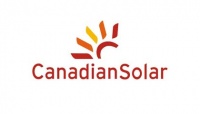S&P Downgrades Canadian Solar (CSIQ) to 'BB-'; Outlook is Negative

Get Alerts CSIQ Hot Sheet
Join SI Premium – FREE
S&P Global Ratings said today that it had lowered its long-term corporate credit rating on Canadian Solar Inc. (Nasdaq: CSIQ) to 'BB-' from 'BB'. The outlook is negative. We also lowered our long-term Greater China regional scale on company to 'cnBB' from 'cnBBB-'. CSI is a Canada-based solar company with most of its production capacity in China.
"We lowered the rating because we expect CSI's leverage and profitability to deteriorate in the coming 12 months," said S&P Global Ratings credit analyst Stanley Chan.
We believe CSI's upstream manufacturing business will face challenges from intensive price competition, weak demand for solar modules, and global overcapacity. As a result, we have lowered our assessment of the company's business risk profile to weak from fair, and its financial risk profile to aggressive from significant.
We expect CSI's leverage to remain high, mainly due to the company's aggressive investment in downstream solar farm assets and the termination of a plan to launch a "yield company" that would hold the solar farm assets. CSI had earlier this month announced a plan to reposition its strategy and take a "build and sell" approach. It proposes to dispose of its solar farm projects. We expect CSI to use the proceeds to sharply lower its debt level over the next 12 months.
We estimate CSI's debt-to-EBITDA ratio will peak in the second half of 2016. The leverage should level off to 4.0x-4.5x in 2017 once the solar farm projects are disposed of and the company puts in strict working capital controls. The deleveraging estimate also factors in our expectation that the company will reduce its capital expenditure for its upstream manufacturing business to US$300 million-US$400 million in 2016 owing to slowing demand growth.
However, we see material downside risk to our base-case assumptions. CSI's disposal of solar farm projects is uncertain and could be hit by adverse and volatile market conditions. We believe any unexpected delay in the process will put pressure on the company's leverage and liquidity in the coming 12 months because of its significant short-term maturing debt. In addition, CSI's working capital management and cost-saving measures are important for the deleveraging.
We expect favorable government policy and subsidies to diminish globally, leading to tougher market conditions for solar module suppliers in 2017 and 2018. We estimate the annual global installations of solar photovoltaic systems will reach 63 gigawatt (GW)–68GW in 2016, and growth will be negative or in low single digits in 2017.
We believe CSI is exposed to risks arising from rapidly changing demand and supply dynamics in the global solar modules industry. This is despite the company being a leading manufacturer with a diversified geographical exposure and flexible cost structure. We continue to see overcapacity in the sector, with very volatile demand due to changes in government policy and customer order patterns. We estimate CSI's EBITDA margin will decrease to around 9% in the coming two years, from 10.3% in 2015. The margin compression will be partially offset by the company's cost-control and efficiency-improvement efforts.
We believe CSI will continue to outperform its solar module peers in the coming industry downturn. That's because of the company's technology differentiation, sound working capital management, and flexible manufacturing capability. We reflect these CSI's strengths in our positive comparable rating analysis.
"The negative outlook reflects our expectation that CSI's leverage is likely to remain high over the next 12 months in a weak and volatile market," said Mr. Chan. "We believe any unexpected delay in the disposal of solar farm projects will weaken the company's leverage and liquidity."
We could lower the rating if CSI fails to lower its debt sufficiently over the next 12 months such that its ratio of debt to EBITDA stays close to 5x or weaker for a sustained period. This could happen if: (1) the disposal of solar farm projects is delayed, or (2) CSI's profitability deteriorates materially; or (3) the company's working capital management weakens; or (4) the company adopts more aggressive debt-funded investments in solar projects or capital expenditure.
We may revise the outlook to stable if CSI improves its cash flow leverage such that its ratio of debt to EBITDA is materially below 5x for a sustained period. This could happen if (1) CSI's profitability strengthens, possibly due to improving cost structure and better product performance; and (2) the company controls its solar farm construction and generates significant free operating cash flow for debt repayment from disposal of solar farm projects.
Serious News for Serious Traders! Try StreetInsider.com Premium Free!
You May Also Be Interested In
- Assa Abloy (ASSAB:SS) (ASAZY) PT Raised to SEK275 at Citi
- Atlas Copco AB (ATCOA:SS) (ATLKY) PT Raised to SEK150 at RBC Capital
- Temenos AG (TEMN:SW) (TMSNY) PT Lowered to CHF65 at Citi
Create E-mail Alert Related Categories
Credit RatingsRelated Entities
Standard & Poor'sSign up for StreetInsider Free!
Receive full access to all new and archived articles, unlimited portfolio tracking, e-mail alerts, custom newswires and RSS feeds - and more!



 Tweet
Tweet Share
Share Up)
Up)